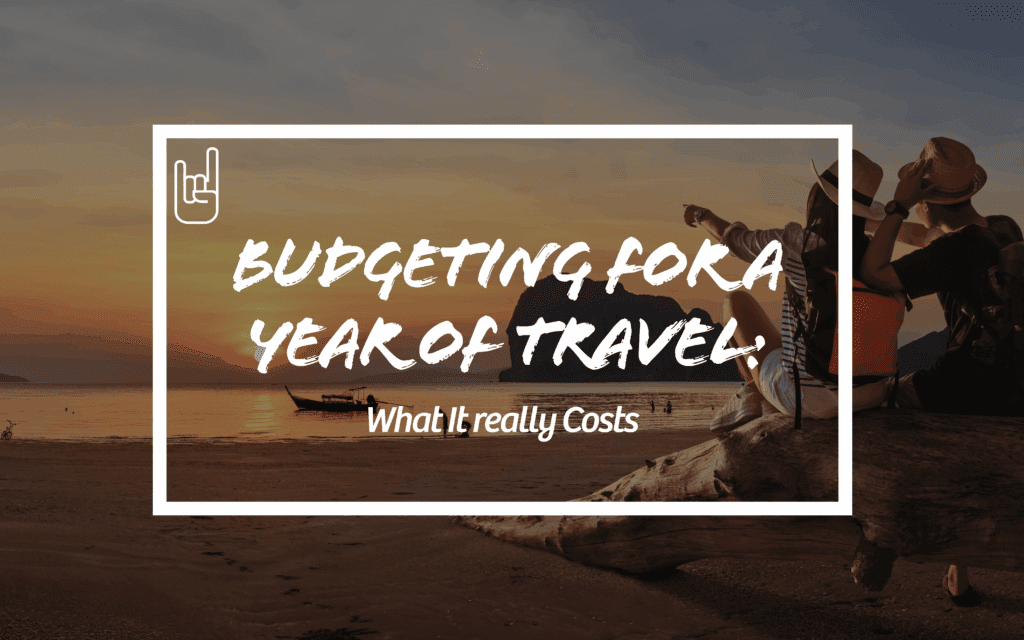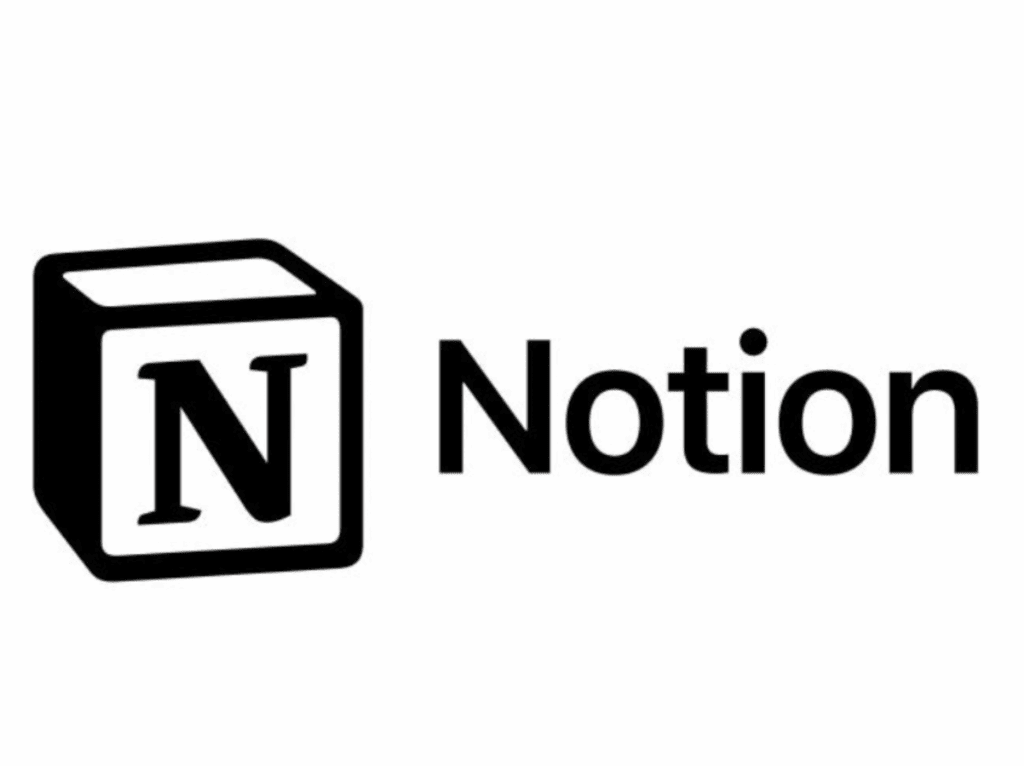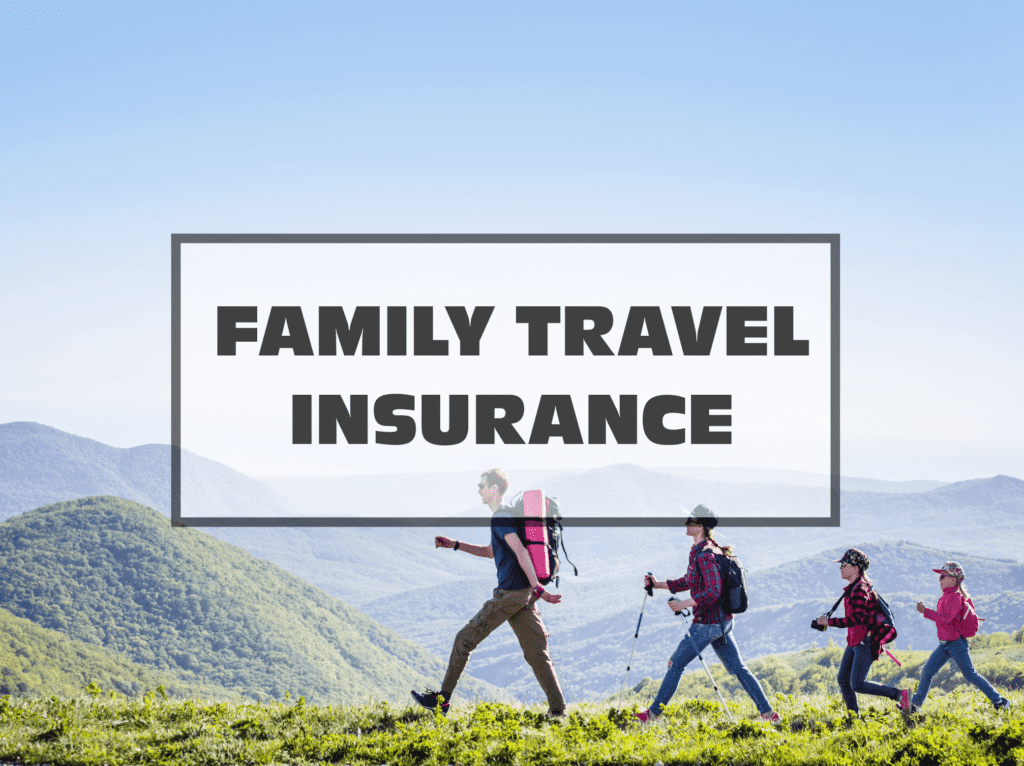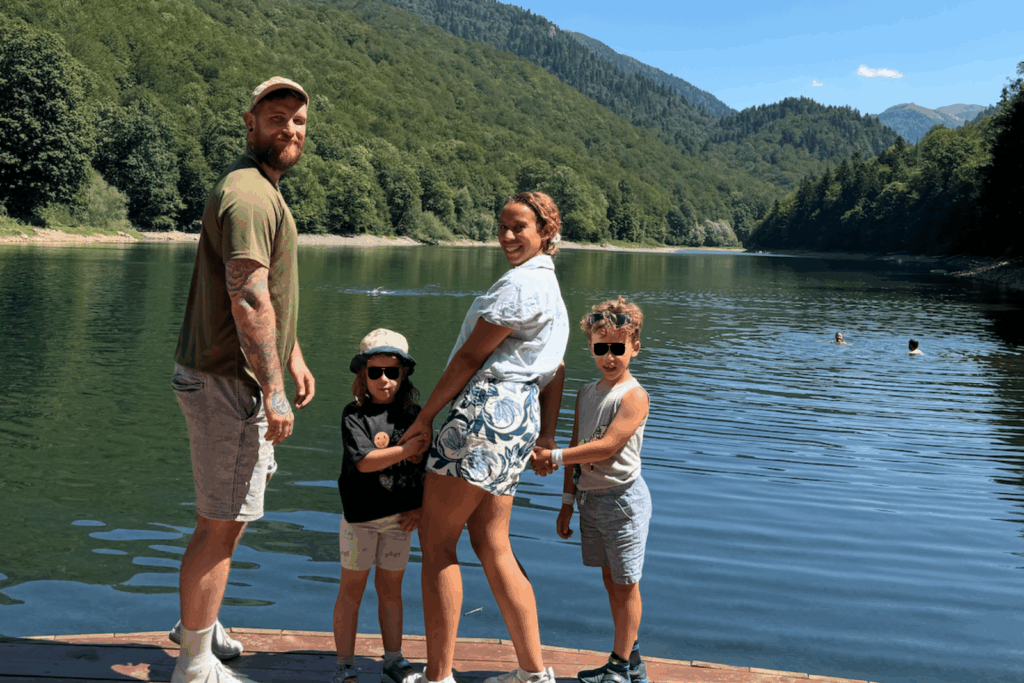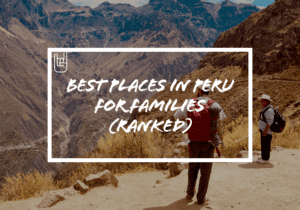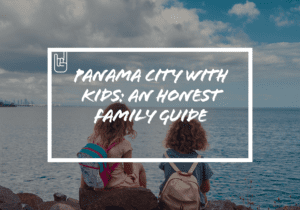Budgeting for a Year of Travel: What It Really Costs
Updated September 2025, how we’re budgeting on the road as a family of four, with real numbers, mistakes, and a dose of honest context.
Featured in: The Broke Backpacker, one of the world’s most-read backpacking blogs.
Budgeting for a Year of Travel: Quick Overview
💳 Money: Wise or Revolut for low-fee international banking.
🛡️ Insurance: Use SafetyWing family insurance coverage keeps monthly costs flexible for families.
📱 Connectivity: Airalo eSIMs avoid pricey roaming plans.
🏠 Accommodation: Long-stay deals on Booking.com or Airbnb; TrustedHousesitters if you’re flexible.
Grab our free Family Travel Budget Template to copy our categories and monthly review system.
How to Afford a Year of Family Travel
We hear it a lot: “Must be nice to be rich.” We’re not. We’re just spending intentionally for a season and building income as we go. The math isn’t magic; it’s planning, trade-offs, and a spreadsheet (or three). This post is the guide we wish we’d found: no fluff, just what it costs and how we make it work as a family of four travelling for a year
“Wow, must be nice to be rich.”
It’s the most common assumption that long-term travel is only for people with trust funds, six-figure savings accounts, or some secret passport to luxury.
But here’s the truth: We’re not rich. We’re just choosing to spend very intentionally for this next chapter of life. And if you’re thinking about doing the same, you don’t need to be rich either. You just need a plan (and a spreadsheet or two).
This post is exactly what I wish I’d found when we started: a no-fluff, practical breakdown of what it actually costs to travel full-time as a family and how we’re making it possible.
This blog is fuelled by caffeine and chaos, if it helps, support our journey.
Table of Contents
Slow Travel Family Budget

Here’s the travel style driving our numbers right now:
2 adults + 2 kids (5 & 7)
Long-term through South America
Slow travel: 1–3 months per stop
Apartments/homes over hotels, cooking most meals
Flights between regions; buses/local transport in between
Part-time remote work while we travel
It’s not luxury. It’s connection > convenience.
What Does It Cost to Travel for a Year with Kids?
Below is our baseline target per month. Actuals will flex by country and season; we publish country recaps with real spend once we leave each place. So how much does it cost to travel for a year with kids.
| Category | Estimated Monthly Cost (USD) |
|---|---|
| Accommodation | $800 – $1,200 |
| Food (groceries + eating out) | $600 – $800 |
| Transport (buses, taxis, flights) | $300 – $400 |
| Travel Insurance | $150 – $200 |
| Activities & Excursions | $150 – $300 |
| SIM cards / Internet | $30 – $50 |
| Subscriptions / Tools | $50 – $100 |
| Misc (clothes, kid stuff, repairs) | $200 – $300 |
Total Monthly Estimate: $2,300 – $3,350
Total for 12 Months: $27,600 – $40,200
Yes, that’s a wide range. But it gives flexibility for splurges (volcano hikes, surf lessons, etc.) and slow stretches (eating rice and beans for a week straight).
I have also created an article to go through the cost of living in South America, this is based on accurate stats.
Read our full article: Monthly Budget for a Year of Family Travel
How Do People Afford to Travel Full-Time with Kids?
Our mix looks like this right now:
Savings runway: We built a modest cushion by selling stuff, pausing subscriptions, and cutting back.
Home income: Renting our house helps cover a chunk of fixed costs.
Work on the road: Part-time marketing/content + early-stage blog/affiliate income.
Small products: Printables and low-ticket resources that align with what we’re using.
No, it’s not guaranteed. But we’re treating this year as a blend of adventure and building something that lasts beyond the trip, we’re planning with realistic long-term travel costs, but what does a real travel budget look like?
How We’re Saving Money for a Year of Travel (Without Feeling Broke)
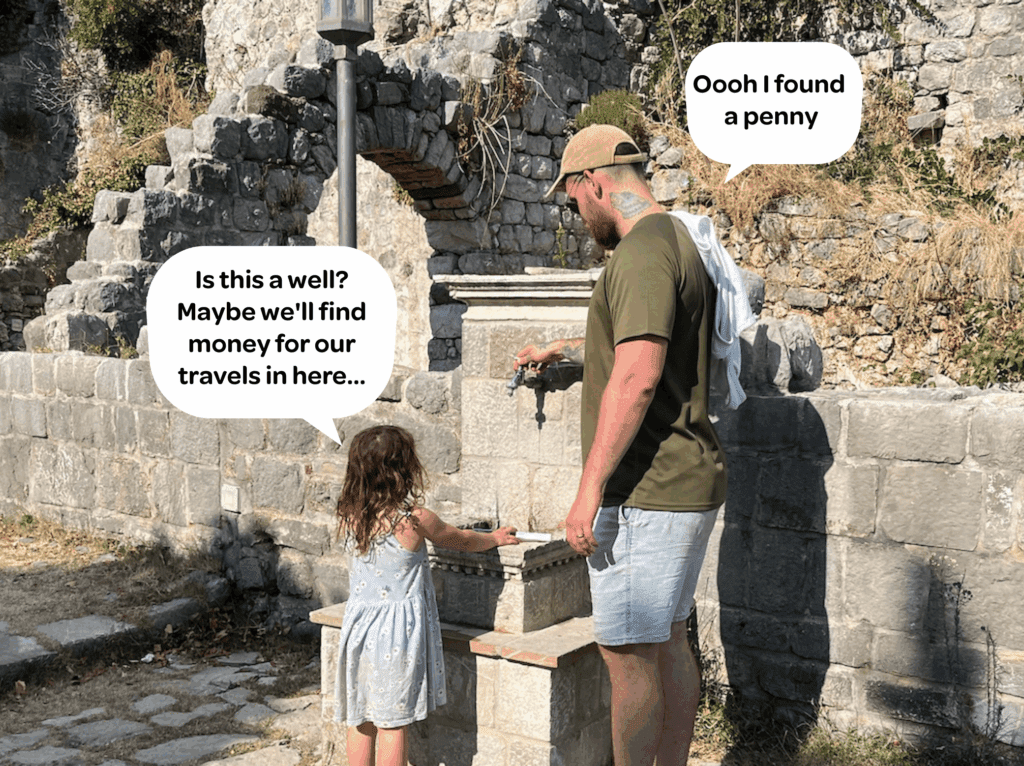
This is the unsexy stuff that’s actually allowed us to save:
- Sold the car (fewer fixed costs).
- Cut subscriptions we didn’t truly use.
- Rented our place part-furnished (reduced storage spend).
- Slowed down (fewer flights = big savings).
- Packed lighter (lower baggage fees, less to replace).
Every little bit adds up. Even $50/month saved = $600 over the year. That’s a month of cheaper accommodation in most South American countries (Yes I’ve already checked)
Read full article: How to Budget for Long-Term Travel with Kids: Our Family Prep Plan
Packing Mistakes That Cost Us Money While Traveling
Quick tangent — but trust me, it’s connected:
Overpacking = overweight luggage fees
Buying gear we didn’t test first = wasted money
Not checking airline bag policies = chaos at check-in
Bringing books/toys that didn’t get used = extra weight + clutter
If you’re budgeting for long-term travel, don’t forget: every thing you bring has a hidden cost. Luggage fees, back pain, lost space, or needing to buy replacements when your “cheap option” breaks.
Overpacking fees, untested gear, airline bag rules… we’ve donated or re-bought more than we’d like to admit. The cheapest item is often the one you buy once and actually use.
Download our Travel Budget Planner
Free Family Travel Budget Template
Copy our categories, monthly review, and notes system. Drop your email and we’ll send the Google Sheet.
How Much Should You Save Before Long-Term Travel?
Our Target Savings for a Year of Family Travel
We aimed for $15k–$20k; in reality we launched closer to $10k plus part-time income. Why that still worked for us:
2–4 months of full expenses covered if income pauses
An emergency buffer separate from our main fund
Breathing room to spin up remote work
If your income is already steady online, you may need less runway. Choose the number that helps you sleep at night.
Whether it takes 6 months or 6 years to plan, this kind of experience is possible.
Best Tools for Tracking Travel Spending and Budgets
Yes, we budget — but we try to make it simple and flexible. Here’s what’s actually working:
1. Notion (custom travel dashboard)
We track fixed vs. variable monthly expenses
Keep a log of country-specific costs
Great for reviewing patterns: where we overspend, where we saved

Use for travel-friendly banking and tracking transactions
Easily set monthly budgets by category
Instant currency conversion helps avoid overspending
3. Google Sheets

Shared with both of us
Each tab = new country, with breakdowns for accommodation, food, transport, activities
Color-coded = satisfaction level (because not all splurges feel worth it)
How to Budget for Travel Insurance and Emergencies
We’re comparing flexible family policies that cover long stays, kids, some adventures, and pre-existing conditions. The short list: SafetyWing, Genki, World Nomads, plus a specialist provider for conditions.
Keep an emergency fund separate (we earmark ~$2,000).
If you work while traveling, ensure your policy allows it.
Document gear values for claims.
Travel Insurance:
We haven’t finalised our provider yet as we’re having to look for travel insurance that covers pre exsisting illness (research in progress), but here’s what we’re looking for:
Covers long-term travel, not just short vacations
Includes kids, natural disasters, political unrest
Reliable customer service
Decent gear coverage (laptops, cameras)
Common family-friendly options people recommend:
SafetyWing (monthly subscription style)
Genki
World Nomads (for more activity coverage)
I will be honest, this is the part that was more expensive than I expected.
👉 Tip: Double-check your insurance if you’re earning money abroad some policies exclude “working while traveling.”
Emergency Fund:
We’ve kept $2,000 aside (Yes this is not a lot), totally separate from our main travel fund. This is for:
Flights home
Medical emergencies
Gear replacements
Bail (just kidding… kind of)
You hope you never touch it, but you’ll sleep better knowing it’s there.
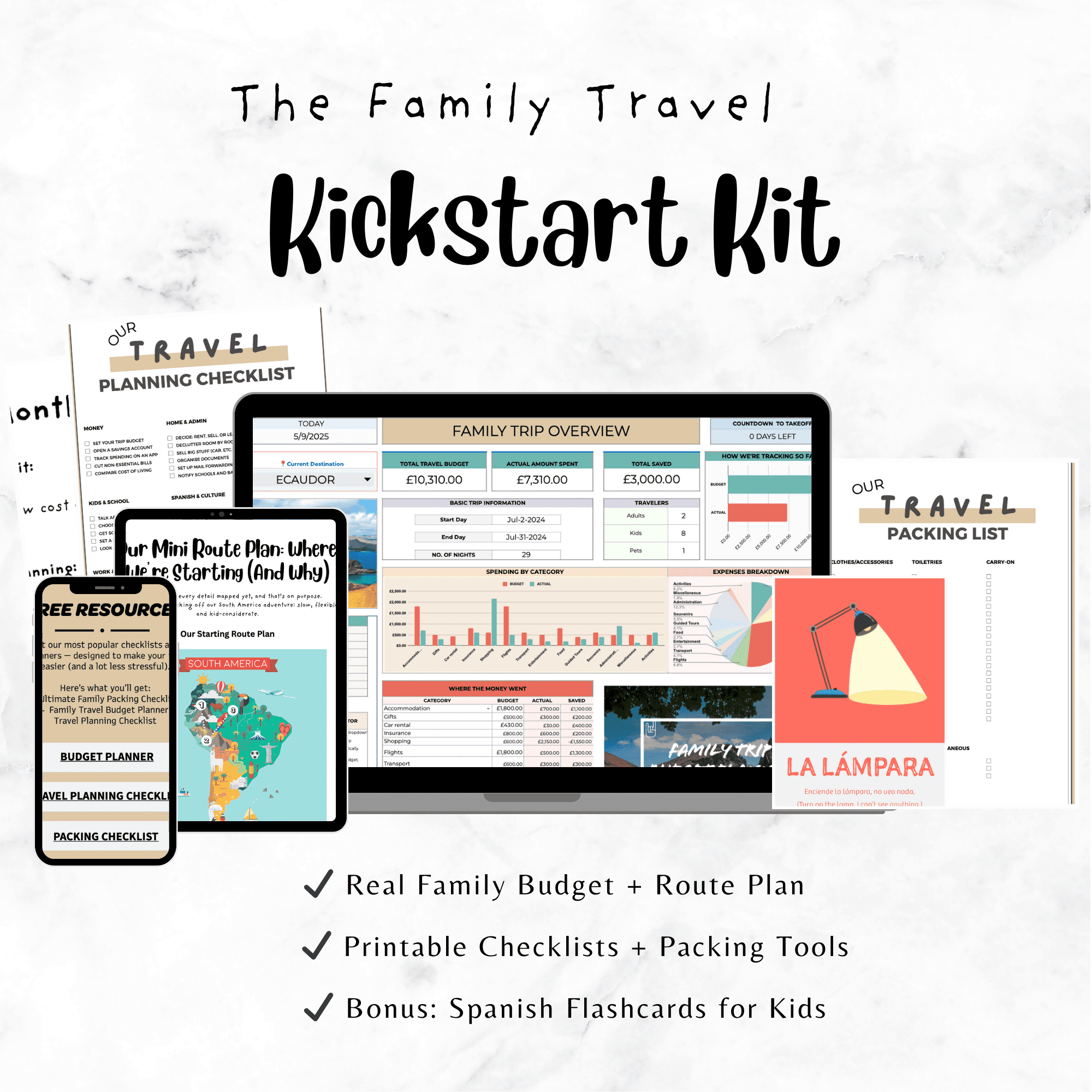
Family Travel Kickstart Kit
This kit is for parents dreaming of long-term travel but drowning in tabs, lists, and late-night overwhelm.
What It’s Like Budgeting for a Year of Travel with Kids
Traveling with kids? It’s not just you and a backpack anymore. Kids bring joy, chaos and a thousand tiny, sneaky expenses no packing list ever warned you about.
We’re not talking theme park tickets or luxury strollers. We’re talking:
Emergency entertainment: New coloring books, a random toy at a market, downloaded Netflix episodes for that 8-hour bus ride with no AC.
Snack inflation: When you’re buying extra snacks just to buy time, not because anyone is actually hungry.
Mini-admissions: Those little entry fees that seem cheap until you’re paying for four people five times a week.
Growth spurts: Clothes and shoes they’ve “suddenly” outgrown mid-trip (bonus points if it’s mid-rainy season).
Birthday ice cream x10: Because every small-town bakery suddenly feels like a must-visit to celebrate your 7-year-old’s half-birthday.
We keep a small “kid chaos” buffer (~$100/month) for the unpredictable. When we don’t use it, it rolls forward.
👉 We built a small “kid chaos” buffer into our budget. Usually around $100/month just for stuff we couldn’t predict but now expect.
Read full article: Is Long-Term Travel Actually Cheaper Than Staying Home?
Visa + Entry Fees That Can Blow Your Travel Budget
Here’s the not-so-fun part of long-term travel: visas aren’t always cheap, and sometimes they’re a total pain.
A few things we’ve learned:
Not every country lets you waltz in for free — some charge $50–$100+ per person just to enter or exit.
Overstaying (even by accident) can rack up fines or ban you from re-entry.
Some countries require proof of onward travel, even if you’re winging it. (We use OnwardTicket to cover this affordably.)
Plan $300–$500 total for visa cards, onward tickets (we use OnwardTicket), and the odd border fee. Boring to budget; brilliant for stress levels.
Surprising Expenses That will blow your Budget (And to Adjust)
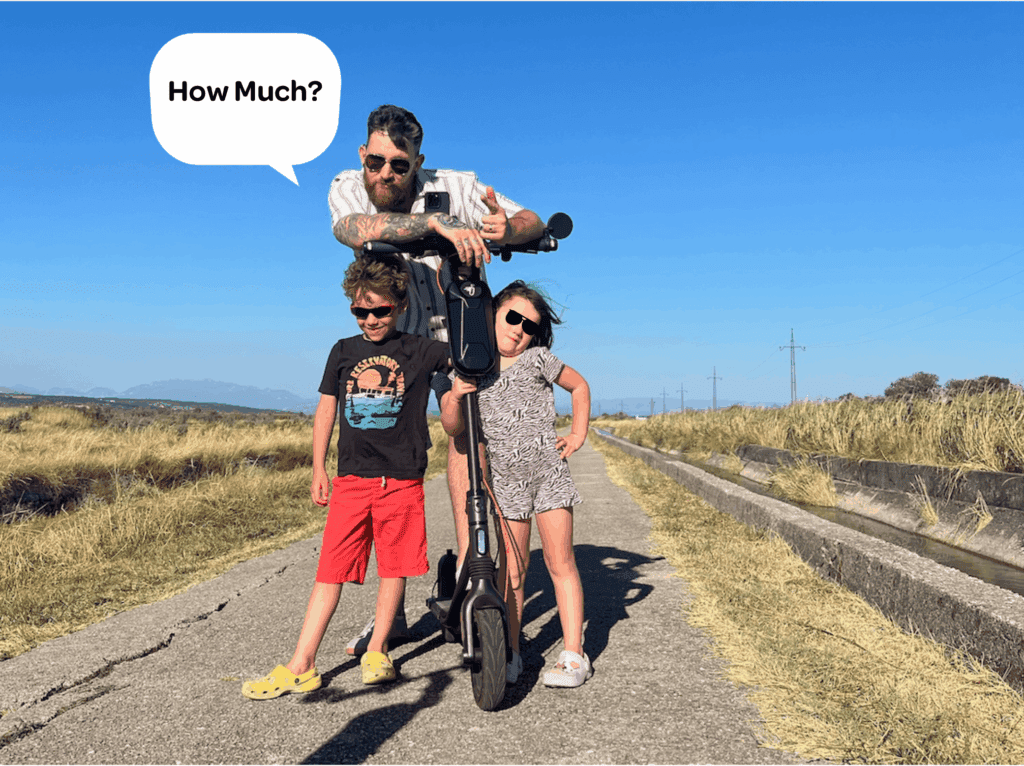
Here’s the stuff that isn’t in most travel budget blogs:
Kids Still Need Stuff
Clothes that fit (because growth spurts ignore your plans)
Birthday/holiday surprises
Homeschooling supplies or learning apps
Visa Fees + Border Surprises
Some countries charge visa-on-arrival or tourist card fees
Proof of onward travel sometimes means last-minute flights or bus tickets
Currency exchange fees in surprise places (hello, airport ATMs)
Double Expenses
If you’re still paying for things back home (like a mortgage), even if you’re renting out your home, don’t forget to factor this in.
Internet Workarounds
We’ve had to upgrade data plans, buy SIM cards multiple times, or get VPNs all small costs that add up but is needed especially if working remotely whilst travelling.
Also read: Airalo vs Nomad
What We’ll Keep Spending On (Even If It’s Not “Budget-Friendly”)
We’re not trying to win any awards for the cheapest trip ever. Some things are just worth the money, especially when you’re traveling with kids.
We’ve decided we’re always going to spend on:
Health + travel insurance
Because nothing wrecks a trip like panic in a foreign hospital.Family experiences
Whether it’s a cooking class, a chocolate-making tour, or a chill boat ride memories first, budget second.Comfortable beds
If we’re sleeping badly, no one is having fun. We’ll pay more for a decent night’s sleep.Spanish tutors or apps
Because learning while traveling is part of the adventure and the chaos. We’re using Talkbox.Mom
This is where our values guide the budget. We call these non-negotiables not because they’re necessary, but because they make the journey meaningful.
@travelventurefour We're prepping for a year of travel with two kids (5 & 7), and these are the lesser-known MVPs we're adding to our packing list👇 🔦 Motion sensor light pucks (no more middle-of-the-night flashlight chaos) 🛍 Ziploc bags — for snacks, toiletries, emergency ice buckets, you name it 🪢 Velcro straps — to keep bags and gear from going rogue 🚿 Suction hooks — for tiny Airbnb bathrooms with no towel space 💨 Toilet spray — no explanation needed if you're sharing a room 😂 🧺 Mesh laundry sack — better than packing cubes for breathability 🌬 Portable fan/torch/power bank combo — one tool, three wins 🧼 Rubber bands — because you’ll always need one, and never have one 🌊 Dry bag — for swimsuits, laundry, or keeping your gear dry in a storm 🧣 Turkish towel — sarong, picnic blanket, towel, you name it These things take up barely any space but make a huge difference. What’s your weird-but-essential travel item? We’re still packing 👇 #familytravel #fyp #travelhack #travellingwithkids #traveltiktok #familyadventure #travelfamily #dadlife ♬ Original Sound - Unknown
Sample Yearly Travel Budgets (Real Numbers)
A few examples from other families we talked to or researched from Reddit and Quora:
| Family | Region | Monthly Spend | Notes |
|---|---|---|---|
| Couple + 2 kids | Southeast Asia | $2,000 | Rented apartments, traveled slowly |
| Solo Mom + 1 kid | Central America | $1,800 | Stayed in smaller towns |
| Family of 5 | Europe | $3,500+ | Fast travel + car rental |
| Our Plan | Latin America | $2,500 avg. | Slow travel, kids learning Spanish, working remotely |
Your style of travel matters more than your destination. Go slower, and you’ll spend less. Stay longer, and you get better deals.
Your travel style matters more than destination. Go slower, stay longer, save more. We’ll add our real monthly averages here as we publish country recaps.
All our must-haves are here — from kid travel gear to dad’s go-to gadgets. Check out our Amazon storefront.
Is It Worth the Money?
Let’s not sugar-coat it, this is a huge investment. But for us, the return is more than financial.
Here's what we’re actually buying:
More time with our kids while they still want to hang out with us
A shot at raising open-minded, resilient, bilingual humans
The kind of memories we don’t need souvenirs to remember
A reset, for us as a family and as individuals
We’re not buying a holiday. We’re investing in a year of growth, language, challenge, and connection. So far, worth every spreadsheet.
FAQ: Real Questions About Budgeting Long-Term Travel
How much did you save before leaving?
We gave ourselves about 12 months to prep and saved as much as we could in that time. Our goal was to have 6–8 months of travel expenses covered in savings before we left, with a bit of income trickling in on the road too.
What’s your monthly budget while traveling?
Right now, we’re estimating $2,000–$2,500/month for the four of us. That includes accommodation, transport, food, activities, insurance, and some buffer for extras. We’ll share real numbers from each country as we go.
Is $2,500/month realistic for a family of four?
It depends on how you travel. If you’re moving slowly, cooking meals, and choosing affordable regions (like parts of Latin America or Southeast Asia), yes — it’s possible. If you’re hopping countries every week or relying on hotels, that number can double fast.
How do you track expenses while traveling?
We’re using a shared Google Sheet for now, but we’ve also tested apps like Trail Wallet and TravelSpend. The key is checking in weekly so nothing snowballs.
What do you actually spend the most money on?
Accommodation is the biggest chunk, followed by food. Transport is lower because we’re moving slowly and using public options where we can. Experiences are a flexible category, we splurge when it’s worth it.
Did you budget differently with kids?
Yes, we’ve allowed for a slower pace, longer stays in places with a kitchen, and a bit more comfort than we’d have aimed for pre-kids. We also budget in fun money for the kids museums, snacks, etc.
Download our Travel Budget Planner
Why Travel Budgeting Isn’t About Sacrifice, It’s About Freedom
We’re not here to say “anyone can travel the world if you just skip your latte.”
But we are here to say: If this is something you really want there’s a way.
Whether it takes 6 months or 6 years to plan, this kind of experience is possible.
It just starts with clarity, commitment… and probably a few spreadsheets.
Follow along @TravelVentureFour for the honest breakdowns — the wins, the wildcards, and the ways we’re making this dream happen (one receipt at a time).

